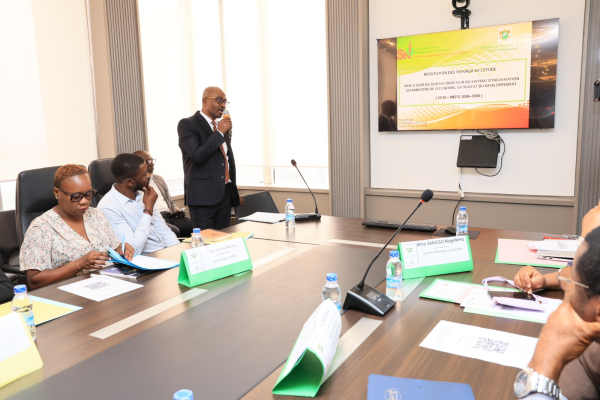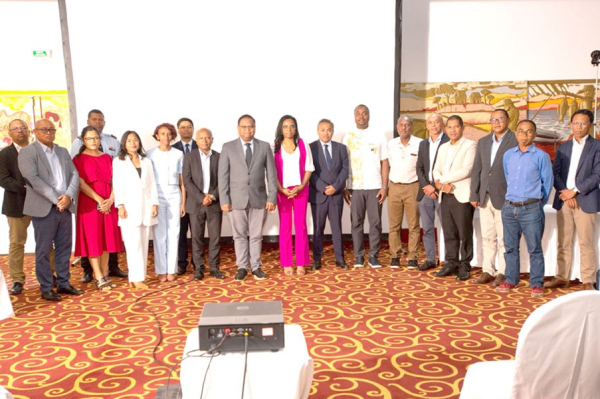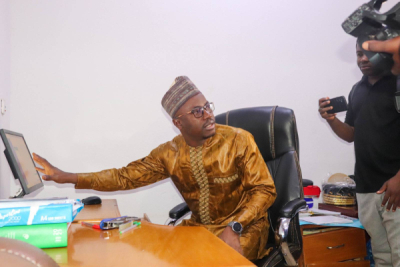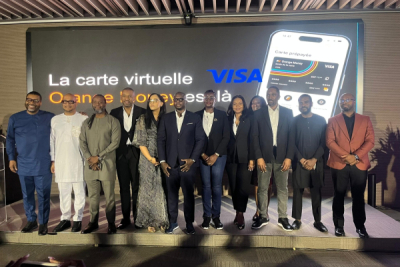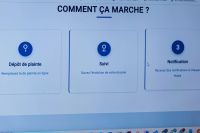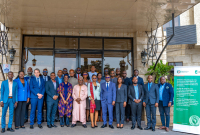
Tech (1151)
- Côte d’Ivoire’s Economy Ministry adopted a 2026–2030 IT master plan to modernize public administration systems.
- The plan allocates CFA10.156 billion ($18 million) across 44 projects and six programs.
- The strategy aligns with a broader national digital push backed by a 37% budget increase for digital transition in 2026.
The Ministry of Economy, Planning and Development adopted the 2026–2030 Information System Master Plan. The strategic framework aims to modernize digital tools, strengthen data security, and optimize public service management. Officials presented the document during an official ceremony in Abidjan.
“The Master Plan now constitutes a strategic tool to strengthen digital governance and improve public action efficiency. This presentation, which brought together around forty participants, opens the way for the implementation of planned actions to provide the Ministry with a more modern, secure, and high-performing digital environment,” said Yéo Nahoua, Chief of Staff to Economy Minister Kaba Nialé.
The National Information Technology Development Company conducted an in-depth diagnostic review to support the update. The assessment identified structural gaps, including weak IT governance, multiple non-interconnected platforms, aging infrastructure, and insufficient security mechanisms.
To address these challenges, the plan relies on four key orientations. The strategy targets IT function professionalization, integrated network deployment, rollout of shared and secure applications, and modernization of technical infrastructure. The plan includes six programs and 44 concrete projects. The framework allocates a total budget of CFA10.156 billion, equivalent to about $18 million.
The initiative aligns with national priorities that position digital technology as a development driver. For 2026, the Ministry of Digital Transition and Digitalization secured a budget exceeding CFA83.2 billion. The allocation represents an increase of about 37% compared with 2025. The funding aims to improve digital performance and nationwide connectivity access.
These allocations add to prior investments that delivered tangible results in 2024. Authorities deployed more than 33,000 kilometers of fiber-optic infrastructure. The government launched digital administrative service platforms. The state expanded 4G coverage across multiple rural areas.
The implementation of the new master plan should support more structured digital governance and stronger system interconnection. The framework should also accelerate public service digitalization. The reforms should reduce processing costs and timelines. The upgrades should strengthen infrastructure resilience against cyber threats.
This article was initially published in French by Samira Njoya
Adapted in English by Ange Jason Quenum
- Madagascar launched the process to draft its national cybersecurity strategy.
- Authorities aim to finalize the framework within three months.
- The strategy will update a cybersecurity law adopted in 2014.
Madagascar continues to structure its digital ecosystem after creating a national cybersecurity body in 2023. Authorities now focus on establishing a legal and strategic framework to protect systems and data amid rising cybercrime.
The Malagasy government formally launched the process to develop its national cybersecurity strategy last week following a kickoff workshop held in Antananarivo.
The event brought together public authorities, digital experts and technical partners. Officials presented the initiative as a key step toward securing the country’s digital space as digital usage expands across public administration, financial services and the broader economy.
“The stakeholders committed to finalizing this national cybersecurity strategy within three months,” said Eric Nirina Rakotomaniraka, head of the digital incident response team at the Computer Incident Response Team (CIRT).
He said the strategy will address key areas, including online child protection, combating gender-based cyber violence, digital justice, and international cooperation in cases of cyberattacks or data breaches.
On an operational level, the future strategy aims to structure cyber incident prevention, detection and response.
The document plans to strengthen national digital forensic capabilities, improve coordination between public institutions and private-sector actors, and support local skills development. Authorities also intend to use the strategy as a foundation to update the regulatory framework, as the 2014 cybersecurity law increasingly fails to reflect evolving technologies and threats.
The initiative comes as digital usage expands but information systems remain fragile. According to the Digital 2025 report, Madagascar counted approximately 6.6 million internet users in 2025, representing just over 20% of the population, a level that remains modest but continues to rise steadily.
At the same time, Madagascar faces limited cybersecurity capacity. The International Telecommunication Union’s Global Cybersecurity Index 2024 ranks the country in Tier 4 out of five.
This classification reflects significant gaps, particularly in technical infrastructure, institutional coordination, skills development and international cooperation.
Authorities expect the national cybersecurity strategy to strengthen protection of digital infrastructure, increase citizen and investor confidence in digital services, and support Madagascar’s broader digital transformation.
By laying the foundations for stronger digital sovereignty, the government aims to create a safer environment for innovation, online public services and the country’s integration into regional and global digital ecosystems.
This article was initially published in French by Samira Njoya
Adapted in English by Ange Jason Quenum
- Digital justice platforms generated more than CFA337 million ($603,700) for the state budget
- Online criminal records accounted for over 90% of applications and revenues
- Authorities launched new digital justice platforms in December to expand reforms
Burkina Faso continues to accelerate the digitalisation of public services to simplify administrative procedures for citizens. Authorities also aim to strengthen state revenues through this transformation.
The gradual digitisation of judicial services has started to generate tangible results. Over two years of operation, online platforms dedicated to nationality certificates and digital criminal records mobilised more than CFA337 million, equivalent to about $603,700, for the state budget.
The Ministry of Justice highlighted these results on Friday, December 12, during a site visit organised in Ouagadougou for the media. The initiative aimed to demonstrate the concrete impact of digital tools designed to modernise judicial document delivery and improve access to public services.
Authorities framed the reform within a national context marked by security constraints and significant geographic disparities.
As of December 11, 2025, the online nationality certificate platform recorded nearly 49,000 applications, generating just over CFA24 million in revenue.
However, the central digital criminal record platform captured most of the activity. The system processed more than 418,000 applications and generated over CFA312 million in revenue.
These volumes reflect rapid user adoption driven by simplified procedures and shorter processing times.
Beyond revenue generation, the platforms address a critical accessibility challenge. The systems allow citizens, including those living in insecure areas or remote regions, to obtain official documents remotely.
The platforms secure issued documents with QR codes, which strengthen authenticity and reduce fraud risks historically associated with paper-based procedures.
The digitalisation process continues to face operational challenges. Authorities still record application rejections, mainly due to non-compliant documents, incomplete files, or attempted falsification.
Technical officials say these issues highlight the need to strengthen user support and public awareness of digital procedure requirements. However, teams confirm that compliant applications usually receive processing times of less than 48 business hours.
Building on these results, the Ministry of Justice continues to expand its digital service offering.
Authorities officially launched several new platforms on December 15 in Ouagadougou, including Justice pénale en ligne, e-Permis de communiquer, and e-RCCM (Online Trade and Movable Credit Register). These launches mark a new phase in the modernisation of Burkina Faso’s judicial and administrative services.
This article was initially published in French by Samira Njoya
Adapted in English by Ange Jason Quenum
- Orange Money Group and Visa signed a strategic partnership to expand access to online payments in Africa and the Middle East.
- The partnership integrates a virtual Visa card into Orange Money’s ecosystem via the Max it app.
- Orange Money operates more than 45 million active accounts across 17 African countries.
Online payments continue to expand rapidly in Africa, driven by the rise of mobile services and e-commerce. However, limited access to secure and interoperable digital payment tools still constrains financial inclusion for a large share of the population.
Orange Money Group and Visa announced on Friday, December 12, in Casablanca that they signed a strategic partnership to facilitate online payments and strengthen financial inclusion across Africa and the Middle East. The collaboration aims to broaden the use of digital financial services as e-commerce and cashless payments accelerate across the region.
Speaking at the announcement, Orange Money Group Chief Executive Officer Thierry Millet said the partnership marks a key milestone in the group’s strategy. “From now on, individuals and entrepreneurs can create their virtual Visa card in seconds and pay online internationally across the entire Visa network. This first step in our strategic partnership brings Orange Money closer to a clear objective: becoming a payment method accepted everywhere, from major e-commerce platforms to local merchants,” he said.
Operationally, the partnership centers on integrating a Visa virtual card directly into the Orange Money ecosystem through the Max it application. Users can generate their card in a few clicks, fund it from their mobile wallet and pay for online purchases on local and international websites. Orange Money initially rolled out the solution in pilot markets such as Botswana, Madagascar and Jordan. The company has since introduced the service in Côte d’Ivoire and plans to expand it to additional countries, including Guinea, Burkina Faso and the Democratic Republic of Congo. Orange Money also plans to launch a physical version of the card to support broader use cases.
The initiative comes as Africa consolidates its position as a global engine of mobile money growth. According to GSMA data, the continent recorded more than one billion registered mobile money accounts in 2024 and accounted for over 70% of global mobile money transactions. At the same time, e-commerce continues to grow, supported by rising internet and smartphone penetration, although limited access to international online payment methods still restrains adoption. By combining Visa’s global acceptance network with Orange Money’s strong local footprint, the partnership aims to address this structural gap.
By leveraging Orange Money’s local presence — with more than 45 million active accounts across 17 African countries — and Visa’s international acceptance network, the partnership could help narrow the digital payments divide. Over time, it aims to integrate millions of users and small businesses into the digital economy by providing payment tools aligned with the requirements of online commerce while reinforcing financial inclusion across the continent.
Samira Njoya
-
The Health Ministry will deploy a national digital platform to coordinate patient transfers between hospitals.
-
The system will impose a maximum 48-hour response time for urgent transfer requests.
-
The platform integrates with ground and air medical transport services, including the Civil Protection and Air Algérie.
Algeria’s government continues to expand its national digitalization agenda, which now extends to the health sector where needs remain critical. Authorities aim to modernize essential services and improve continuity of care across the country.
The Health Ministry plans to launch a digital platform to organize patient transfers between hospitals. Health Minister Mohamed Seddik Aït Messaoudene announced the initiative on Thursday, 11 December, during a presentation before the Council of the Nation. The platform seeks to streamline a process that remains complex, especially in southern and High Plateaus provinces where access to specialized care remains limited.
The system will establish a fully digital workflow for filing, tracking and validating transfer requests, which are currently processed through multiple uncoordinated channels. The minister said these operations follow a strict regulatory framework requiring each request to be reviewed within reasonable timelines. He added that urgent cases must receive “a maximum response time of 48 hours.”
This project forms part of Algeria’s 2030 national digital transformation strategy, which prioritizes the modernization of public services. It comes as authorities seek to improve continuity of care across a vast territory with significant geographic disparities. Southern provinces, which represent more than 80% of Algeria’s land area, continue to face limited access to several medical specialties, making transfers essential for cases requiring advanced expertise.
The platform will automate several key steps, from registering requests to verifying medical criteria and transmitting files to the teams responsible for evaluation. It will also track compliance with response deadlines and facilitate the activation of emergency protocols when needed.
The system will connect to all medical transport services, including ground ambulances and air evacuation units operated by the Civil Protection, Air Algérie, and, in the most critical situations, the Algerian Air Force.
The transfer-management platform aligns with Algeria’s broader effort to digitize its health system. The government is deploying the Electronic Medical Record (EMR), establishing the National Agency for Health Digitalization (ANNS), expanding telemedicine, and adopting new national cloud solutions for hosting health data.
This article was initially published in French by Samira Njoya
Adapted in English by Ange Jason Quenum
-
Gara Store has signed a strategic deal to distribute Média-Participations' French-language catalog across Africa.
-
The partnership addresses structural market barriers including mobile-first access and local payment constraints.
-
Média-Participations targets Africa as a priority expansion market following growth in Europe, America, and Asia.
The African digital content market experiences rapid growth. A young and connected population drives this trend. However, infrastructure limits access. High costs and a lack of adapted platforms also impede the sector.
Gara Store announced a strategic distribution agreement with European group Média-Participations on Tuesday, December 9. Gara Store operates as an African digital content distribution platform. Média-Participations functions as a major player in French-language comics and family entertainment. This partnership targets the African public with thousands of iconic works. It also strengthens the group's presence in an expanding market.
The agreement covers the French-language catalog of Média-Participations. This inventory includes comics, youth content, and spiritual works. Gara Store will integrate these titles into its system. The platform currently conducts tests in several African countries during its deployment phase. The developers designed the system to address structural obstacles on the continent. These challenges include payment difficulties, mobile Internet access, and local economic constraints. The partners also present the deal as a lever for the African digital entertainment market. It supports creators. It builds a competitive local cultural ecosystem.
The collaboration occurs as the African digital content market sees sustained growth. The continent counts more than 670 million Internet users. Mobile devices provide access for a majority of these users. Mobile networks handle over 70% of Internet connections in Africa. Online entertainment demand increases rapidly within a very young population. People under 25 represent more than 60% of this demographic. However, legal access to cultural content remains limited despite this dynamic. High costs cause this bottleneck. Payment difficulties and fragmented catalogs also contribute to the problem.
Média-Participations views this agreement as a strategic step in its international expansion. The group targets Africa as a new priority market following Europe, America, and Asia. Julien Papelier, General Director of the group, highlighted the significance of the move. "This agreement opens many perspectives for generations of Africans who will discover or rediscover our iconic titles."
The partnership between Gara Store and Média-Participations should expand access to reference content on the continent. The deal aims to encourage collaboration between African creators and international players. It demonstrates the potential of the African digital entertainment market. It generates economic opportunities for the entire value chain. Furthermore, data collected via the platform will help analysts understand local usages and expectations. This insight allows the companies to anticipate future market needs.
This article was initially published in French by Samira Njoya
Adapted in English y Ange Jason Quenum
-
Burkina Faso creates the “Criminal Justice System Module” to allow citizens to file complaints online starting 15 December 2025.
-
The platform aims to reduce administrative delays, strengthen transparency and streamline judicial workflows.
-
Burkina Faso ranked 175th out of 193 countries in the UN 2024 E-Government Development Index, highlighting the scale of digitalisation challenges.
Burkina Faso continues to accelerate its digital transformation as the country faces persistent obstacles to accessing justice. Authorities develop digital tools to simplify procedures, strengthen transparency and improve the responsiveness of judicial services nationwide.
The Ministry of Digital Transition and the Ministry of Justice announced on Tuesday, December 9, the completion of the “Parquet Module of the Criminal Justice System,” a platform designed to enable citizens to file complaints online with public prosecutors across Burkina Faso. The government plans to officially launch the system on December 15, 2025, in Ouagadougou.
Authorities present the Parquet Module as a major public-service modernisation tool. The platform will allow citizens to submit complaints remotely and will give judicial actors the ability to process cases securely and in an integrated manner, from initial filing to verdict. The solution aims to cut administrative delays, reinforce traceability and streamline the work of legal professionals.
The launch aligns with the government’s digital-transformation policy, pursued for several years. Authorities generalised the online criminal-record system in 2023, progressively digitised the penal chain and modernised the Justice Ministry’s information systems. The initiative also responds to structural constraints that continue to hinder access to justice, including slow procedures, congested clerks’ offices and mobility challenges in certain regions.
With the Module Parquet, authorities expect to offer citizens a smoother experience and reduce pressure on physical service counters. The platform should accelerate information flows, improve transparency in complaint processing and strengthen proximity between prosecutors and users. Over time, the data generated by the service will help authorities refine the management of the penal chain and support reforms aimed at making justice more accessible and efficient nationwide.
The United Nations’ E-Government Development Index, which measures online public-service delivery, telecom connectivity and human-capacity levels, ranked Burkina Faso 175th out of 193 countries in 2024 with a low score of 0.2895. The ranking highlights the scale of the remaining challenges in expanding digital public services.
This article was initially published in French by Samira Njoya
Adapted in English by Ange Jason Quenum
-
Djibouti prepares to operationalize its new National Cybersecurity Authority.
-
The agency receives equipment and a defined mandate to oversee national cyber norms and incident response.
-
The move aligns with the country’s ambition to become a regional tech hub by 2035.
Djibouti plans to bring its newly created National Cybersecurity Authority (ANC) into service as the country pushes to position itself as a regional technology hub by 2035. The International Telecommunication Union (ITU) states that this ambition requires stronger commitments to cybersecurity to unlock the full potential of the digital economy.
Authorities advanced the ANC’s rollout last week during a meeting between senior officials from the Ministry of Digital Economy and the agency’s new director. The session reviewed the progress of ongoing cybersecurity projects, set priority cooperation areas, and organized the delivery of technical equipment.
The government supplies the agency with high-performance computers for incident response, international-standard firewalls and network-security systems, high-capacity servers for sensitive data, monitoring screens for security operations centers, and professional cybersecurity licenses. These tools aim to equip the ANC to oversee and enforce national cyber-defense measures.
The legislation establishing the ANC, which lawmakers examined on November 10, gives the agency responsibility for setting national cybersecurity norms and protection procedures for critical sectors. The law also mandates the creation of a national cyber-incident monitoring and response center, expanded international cooperation against cybercrime, and training and awareness programs for public and private actors.
This institutional buildup forms part of Djibouti’s broader push to secure its digital infrastructure as its digital transformation accelerates. The country has already adopted a National Cybersecurity Strategy and a Digital Code and hosts an annual National Cybersecurity Week. In October 2025 in Hanoi, Djibouti signed the UN Cybercrime Convention, joining 21 African nations among 71 global signatories. The country had previously ratified the African Union’s Malabo Convention on cybersecurity and data protection in November 2023.
Despite these steps, Djibouti remains in the second-to-last tier of the ITU Global Cybersecurity Index, posting 11.84 out of 20 in the legislative pillar. The ITU argues that Djibouti must increase efforts in organizational, technical and capacity-building domains, as well as in international cooperation, to close the gap with regional peers.
This article was initially published in French by Isaac K. Kassouwi
Adapted in English by Ange Jason Quenum
- Ethiopia launches E-Tamirt platform to streamline industrial sourcing and sales
- Tool supports supply-chain efficiency and boosts competitiveness under digital strategy
- GSMA projects sizable economic gains as digitalization expands across sectors
Ethiopia’s Ministry of Industry, in partnership with state-owned Ethio Telecom, on Tuesday launched an e-commerce platform called E-Tamirt. The platform provides a centralized marketplace where manufacturers can source raw materials, connect with suppliers and sell their products to buyers in Ethiopia and regional markets.
According to Ethio Telecom, E-Tamirt will play a strategic role in strengthening the shift from retail-based trade to manufacturing and will help local products compete more effectively with imports.
Industry Minister Melaku Alebel said the platform helps ease supply and distribution bottlenecks by providing a unified digital channel for industrial transactions. He added that it supports national efforts to increase production capacity, foster innovation and improve long-term competitiveness.
The initiative is part of Ethiopia’s broader digital transformation agenda. In late November, the government adopted a new digital strategy running through 2030 to expand digital public services, modernize the economy and promote digital inclusion.
The GSMA estimates that Ethiopia’s digital transformation could add 319 billion birr, or nearly 2 billion dollars, to the economy by 2028, with major gains expected in agriculture, transport, health, public administration, trade and industry.
The industrial sector alone could generate 108 billion birr, create 180,000 jobs and add 9 billion birr in tax revenue. According to the GSMA, Ethiopia’s manufacturing activity is still heavily centered on agro-processing, but there is substantial potential for growth through diversification, higher industrial output, stronger investment in research and development and greater local processing and value creation. Digital technologies can also help the government raise manufacturing exports from 13 percent in 2019 to 48 percent by 2030.
Isaac K. Kassouwi
- ECOWAS drafts its first regional e-government strategy to harmonize public-service digitalization.
- The plan includes shared cybersecurity mechanisms, interoperable digital infrastructure and data-governance frameworks.
- Ghana, Cape Verde, Côte d’Ivoire and Senegal show the strongest national progress, according to the UN DESA 2024 Index.
ECOWAS is developing its first regional e-government strategy as West African states accelerate national digital-administration reforms. Government officials, ICT experts and technical partners met last week in Abuja to review and validate the strategic directions of the forthcoming framework.
The strategy aims to build an interoperable public digital infrastructure for the region, strengthen data-governance systems, and support member states in modernizing administrative services. It also seeks to introduce shared cybersecurity mechanisms and align national policies that remain fragmented across the bloc.
The initiative complements ongoing ECOWAS digital-transformation programs such as WARDIP, which targets faster regional digital integration. It also reflects the ambitions of ECOWAS Vision 2050, which calls for a connected, resilient community built on modern institutions.
Member states have already undertaken major e-government reforms. Ghana has launched reference digital-ID platforms; Cape Verde continues to consolidate one of the region’s most advanced electronic administrations; Côte d’Ivoire is betting on centralized online public services; and Senegal is expanding its e-services ecosystem, supported by a unique identifier and interoperability systems. A regional strategy is now seen as a natural step to scale and coordinate these efforts.
If adopted, the strategy could significantly improve administrative efficiency, enable secure data circulation, strengthen transparency and accelerate regional integration by allowing citizens and businesses to access public services across borders.
According to the 2024 UN DESA E-Government Development Index, several ECOWAS states rank among West Africa’s top performers. Ghana stands at 108th globally, followed by Cape Verde (109th), Côte d’Ivoire (124th) and Senegal (135th). These rankings highlight a strong regional momentum and show that, despite uneven progress, the foundations for a shared strategy are already in place.
Samira Njoya
More...
-
Algeria launched a national digital platform on December 1 to report corruption in the social sector.
-
Transparency International ranks Algeria 107th globally in the 2024 Corruption Perceptions Index.
-
Nearly 9,500 civil servants have already been trained to use the new reporting tool.
Algeria launched a digital platform to help citizens and public officials report corruption in the social sector, strengthen transparency, and improve trust in public institutions.
The country continues to face systemic corruption that undermines public services and weakens citizen confidence. Consequently, authorities aim to modernize governance tools and reinforce accountability across the administration.
The Ministry of National Solidarity, Family and Women’s Affairs launched the national platform on December 1. The tool, available on both mobile and desktop, enables users to report suspicious practices, upload digital evidence, and track the status of their submissions.
Minister Soraya Mouloudji said the platform “forms part of the implementation of the national strategy to combat corruption and strengthen integrity, which is based on public ethics, the promotion of a culture of integrity within institutions, and improved transparency in the management of public funds.”
The platform centralizes all tools required for effective processing of corruption alerts: a structured reporting form, a secure space to upload supporting documents, an option for anonymous submissions, and a dashboard that informs users of the progress of their cases.
The ministry intends to improve administrative responsiveness, shorten processing times, and ensure strict traceability of all reports.
The launch comes as Algeria continues to struggle with governance issues. Transparency International’s Corruption Perceptions Index 2024 ranks Algeria 107th out of 180 countries, with a score of 34 out of 100, reflecting persistent public-sector corruption concerns.
According to the ministry, nearly 9,500 public agents have already received awareness and training sessions to ensure proper use of the platform and promote a culture of transparency in public services. The government considers these skills essential to guarantee the system’s reliability and the credibility of follow-up actions.
Although the platform could democratize reporting, improve the quality of evidence, and increase public pressure for stronger anti-corruption measures, its success depends on several key factors: serious investigations, effective whistleblower protection, and public visibility of enforcement outcomes.
This article was initially published in French by Samira Njoya
Adapted in English by Ange Jason Quenum
- Côte d’Ivoire launched Tradepost to digitalize postal logistics and ease cross-border trade in ECOWAS.
- Authorities expect the system to accelerate customs procedures, reduce logistics costs and provide full shipment traceability.
- The initiative targets improved access to African and international markets for Ivorian SMEs.
Côte d’Ivoire launched the Tradepost project on December 1 in Abidjan to modernize postal logistics and facilitate cross-border commerce within ECOWAS. The Universal Postal Union (UPU), La Poste de Côte d’Ivoire and the West African Postal Conference (CPEAO) jointly support the initiative. The project signals a new phase in regional economic integration and in the digitalization of postal services.
Assoua Raymond, chief of staff at the Ministry of Digital Transition and Digitalization, said Tradepost will “accelerate customs procedures through digitalization, reduce logistics costs and delivery times, while offering full shipment traceability.” He added that the platform represents “a strategic instrument to connect Ivorian SMEs to African and international markets.”
Tradepost aims to digitalize and harmonize procedures linked to trade flows, including parcel declaration, processing, tracking and customs formalities. It also seeks to connect users to regional and global e-commerce platforms. Authorities designed the system to remove long-standing barriers to cross-border trade in West Africa, such as fragmented regulations, high logistics costs, slow procedures and weak integration of digital ecosystems.
The launch aligns with the rapid rise of digital trade in West Africa. Improved connectivity, broader digital public services and the growth of online-commerce platforms drive this momentum. Côte d’Ivoire stands out in this trend. The country’s e-commerce market reached more than CFA280 billion ($495.5 million) in 2023 and is expected to grow at a compound annual rate of 11.3% through 2027, according to Ivorian e-commerce industry stakeholders.
Authorities expect Tradepost to strengthen parcel traceability and harmonize procedures across borders. They said the system should reduce obstacles to regional commerce, improve market access for artisans, farmers and young entrepreneurs, and support a more transparent and efficient e-commerce ecosystem in ECOWAS. The data-driven approach will allow policymakers to identify bottlenecks, guide investment and sustain long-term digital and economic integration.
This article was initially published in French by Samira Njoya
Adapted in English by Ange Jason Quenum
-
Togo integrates three new procedures online: renunciation of nationality, reinstatement of nationality, and modification of patronym or matronym.
-
The national portal now centralises 101 digital public services, including passports, residency cards and nationality certificates.
-
The UN’s 2024 EGDI report ranked Togo 161st out of 193, highlighting a major digitalisation gap the government actively seeks to close.
Togo aims to digitise all public services in the coming years to simplify administrative processes and improve access for all citizens. The addition of new online procedures confirms the progress of this nationwide transformation.
Togo continues to modernise its administration by adding three new services to the national portal service-public.gouv.tg. Citizens can now complete online the renunciation or reinstatement of Togolese nationality and the modification of their patronym or matronym.
The Ministry of Justice and Human Rights leads these digital procedures as part of a methodical modernisation effort. The platform now enables users to complete entire processes remotely: application submission, real-time tracking and receipt of decisions. Officials strengthened the national digital one-stop shop to centralise administrative services and improve accessibility.
This deployment comes as Togo accelerates the digitalisation of administrative services. In recent months, the national portal added major services, including applications for nationality certificates, passport renewals, residence permits, criminal records, construction permits and other formalities. With these additions, the platform now offers 101 online services.
The integration of the three new procedures addresses key priorities: reducing citizens’ travel, increasing procedural transparency, shortening processing times and improving administrative efficiency. The expansion also strengthens administrative inclusion by enabling citizens—especially those far from urban centres—to access essential services without geographic constraints.
This acceleration of digital transformation occurs as Togo works to close a significant gap in public-service digitalisation. The 2024 UN E-Government Development Index (EGDI) assigned Togo a score of 0.3920, ranking the country 161st out of 193, a result that underscores the scale of the challenges ahead. The progress achieved in recent months demonstrates the government’s determination to modernise public administration, improve accessibility and integrate Togo’s public sector into the digital era.
This article was initially published in French by Samira Njoya
Adapted in English by Ange Jason Quenum
-
Enovation Factory and UNDP Cameroon launched Scale 32, a 14-month national programme to support 32 tech startups.
-
The programme provides intensive training, mentorship, workspace access and investor matchmaking, followed by 12 months of alumni support.
-
Cameroon seeks to strengthen its technology ecosystem amid low startup survival rates, weak governance and limited access to capital.
Cameroonian startups continue to struggle to attract investment as limited managerial expertise and weak ecosystem structuring hinder their growth. Observers argue that targeted support remains essential to improve competitiveness and unlock financing opportunities.
Enovation Factory, a Cameroon-based incubator and accelerator, launched in partnership with UNDP Cameroon a national 14-month initiative named Scale 32. The programme aims to support 32 technology startups by addressing their main barriers to growth, including access to capital, management skills and investor networks.
The programme unfolds in two phases. The first cohort will receive six months of intensive support from January to June 2026. The second cohort will benefit from a similar cycle from June to December 2026.
Enovation Factory will integrate selected startups into one of its two streams: Newbie, which targets early-stage or ideation-level projects, and Cracker, which targets operational startups seeking accelerated growth. The support package includes specialised training, mentorship, workspace access and connections with institutional partners and investors.
Enovation Factory will transition each startup into its Alumni programme after the six-month support phase. The incubator will provide an additional 12 months of follow-up, which includes access to its network, financing opportunities and major ecosystem events. The structure aims to ensure that each company consolidates the skills and gains achieved during the programme.
The initiative comes as Cameroon seeks to fortify its technology ecosystem and stimulate job creation. Policymakers attempt to complement existing sector-building efforts by addressing low startup survival rates and the weak governance that affects many early-stage companies.
However, challenges persist. The small volume of capital raised by local startups, the limited number of firms able to attract investors and the region’s low share of venture-capital flows underscore the need for deeper structural reforms. Analysts stress the need to strengthen corporate governance, improve investor appeal, reinforce institutional support and enhance the visibility of Cameroonian startups on the global stage.
Startups operating in technology, agritech, healthtech, fintech, edtech, green economy and other innovative sectors may apply before 18 December via the link provided by Enovation Factory: https://www.enovation-factory.com/postuler.
This article was initially published in French by Samira Njoya
Adapted in English by Ange Jason Quenum


